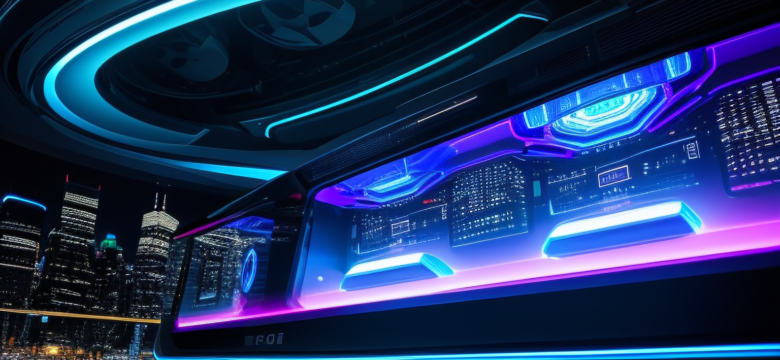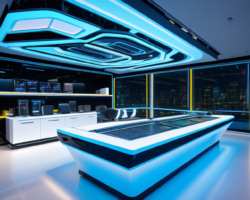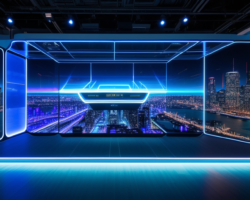In today’s fast-paced world, it often feels like we are living in a science fiction novel. The technological advancements we witness daily seem almost magical, transforming the mundane into the extraordinary. From the moment we wake up to the sound of our smart alarms to the time we tuck ourselves into bed with our health-monitoring devices, technology is seamlessly integrated into our lives. Have you ever thought about how artificial intelligence can predict your preferences or how smart home devices can adjust the lighting just to suit your mood? It’s like having a personal assistant who knows you better than you know yourself!
These innovations are not just about convenience; they are reshaping our interactions with the world around us. Imagine walking into your home, and the lights turn on automatically, the temperature adjusts to your liking, and your favourite music starts playing—all without lifting a finger! This is the magic of smart home technology. It’s about creating environments that cater to our needs, enhancing our comfort, security, and even energy efficiency.
As we dive deeper into this article, we will explore various realms of innovation, including the rise of AI, the wonders of health tech, and the immersive experiences brought by augmented and virtual reality. Each of these advancements is like a piece of a puzzle, coming together to create a future that seems almost too good to be true. Are you ready to discover the magic?
The Rise of Artificial Intelligence
Artificial intelligence (AI) has truly become the wizard of our modern world, transforming industries and reshaping our daily lives in ways that feel almost magical. From self-driving cars to virtual assistants, AI is everywhere, learning and adapting to our needs. Imagine waking up to a home that knows your schedule better than you do; that’s the power of AI at play!
As we dive deeper into the realm of AI, we see its impact across various sectors. For instance, in healthcare, AI algorithms are aiding doctors in diagnosing diseases with remarkable accuracy. This not only saves time but also enhances patient outcomes. Similarly, in finance, AI is revolutionising trading strategies, allowing for faster and more informed decisions.
But what does the future hold? The potential of AI seems limitless. We can expect advancements that will not only improve efficiency but also create entirely new ways of interacting with technology. Consider the following:
- Personalisation: AI can tailor experiences to individual preferences, making everything from shopping to entertainment more enjoyable.
- Automation: Routine tasks can be automated, freeing up time for more creative pursuits.
- Enhanced Decision-Making: With data-driven insights, AI supports better decision-making processes in businesses.
In conclusion, the rise of artificial intelligence is akin to a technological renaissance, where the possibilities are as vast as our imagination. As we embrace these innovations, it’s essential to consider both the exciting opportunities and the ethical implications they bring along. After all, with great power comes great responsibility!
Smart Home Technology
Imagine stepping into your home and having it respond to your every need, almost as if it can read your mind! has turned this dream into reality, revolutionising how we interact with our living spaces. From smart thermostats that learn your schedule to security systems that alert you of potential threats, these innovations are designed to enhance convenience, security, and energy efficiency.
One of the most fascinating aspects of smart home technology is its ability to integrate various devices into a single, cohesive system. For instance, you can control lights, heating, and even your coffee machine all from your smartphone or through voice commands. This level of connectivity not only simplifies daily tasks but also helps save energy and reduce bills. Consider the following benefits:
- Convenience: Automate daily tasks and routines.
- Security: Monitor your home remotely with real-time alerts.
- Energy Efficiency: Reduce wastage through smart energy management.
As we embrace this technology, the future looks bright, with advancements like AI-driven assistants that can predict your needs. It’s like having a personal genie at your beck and call! So, why not step into the future and make your home as smart as your phone?
Health Tech Innovations
In today’s fast-paced world, health technology innovations are not just changing lives; they’re revolutionising the entire healthcare landscape. Imagine a world where your health is monitored in real-time, where doctors can diagnose conditions without you even stepping foot in a clinic. Sounds like magic, right? Well, it’s happening now! From wearable devices that track your heart rate and sleep patterns to telemedicine platforms that connect you with specialists from the comfort of your home, the advancements in health tech are nothing short of astonishing.
Take, for instance, the rise of telemedicine. This innovative approach allows patients to consult with healthcare professionals via video calls, eliminating long waiting times and travel hassles. It’s like having a doctor in your pocket! Moreover, these technologies are particularly beneficial for those living in remote areas, ensuring that quality healthcare is accessible to everyone.
Additionally, wearable devices have transformed personal health management. These gadgets not only track fitness metrics but also alert users to potential health issues. With features like heart rate monitoring, blood oxygen levels, and even ECG readings, they empower individuals to take charge of their health. Can you imagine the peace of mind that comes with knowing your health is being monitored 24/7?
As we continue to embrace these innovative technologies, the future of healthcare looks brighter than ever. The integration of AI in diagnostics and treatment planning is just around the corner, promising even more personalised and efficient care. In essence, health tech is not merely a trend; it’s a transformative force that is reshaping how we perceive and manage our health.
Augmented and Virtual Reality
Imagine stepping into a world where the lines between reality and imagination blur. Augmented Reality (AR) and Virtual Reality (VR) are not just buzzwords; they are thrilling technologies that are reshaping our experiences in remarkable ways. With AR, digital elements seamlessly integrate into our physical surroundings, enhancing what we see and interact with. Think of it as a layer of magic sprinkled over the real world, where your smartphone can turn a mundane street into a vibrant art gallery or an interactive game zone.
On the other hand, VR transports you entirely to a different universe. You can explore ancient ruins, dive into the depths of the ocean, or even soar through the skies, all from the comfort of your living room. These technologies are not only entertaining; they are revolutionising fields such as education, training, and healthcare. For instance, medical students can practice surgeries in a risk-free environment, while soldiers can train for combat scenarios without leaving the base.
As we look to the future, the potential of AR and VR seems limitless. From enhancing retail experiences to transforming social interactions, these technologies offer a glimpse into a future where our realities are enriched by digital wonders. So, are you ready to step into a world where anything is possible?
Transportation Technologies
Transportation technologies are evolving at an astonishing pace, much like a magician pulling a rabbit out of a hat. Imagine a world where your car drives itself while you sit back and catch up on your favourite series! Electric vehicles (EVs) are becoming the norm rather than the exception, significantly reducing our carbon footprint and changing how we think about travel. With advancements in battery technology, these vehicles are now capable of travelling longer distances and charging faster than ever before.
Moreover, the concept of autonomous driving is no longer confined to science fiction. Companies are investing heavily in self-driving technology, aiming to make our roads safer and more efficient. But what does this mean for the future? Well, it could lead to a dramatic decrease in traffic accidents caused by human error and even reshape our urban landscapes as we rethink parking spaces and road designs.
Additionally, innovations like hyperloop systems and electric scooters are revolutionising short-distance travel, making it quicker and more environmentally friendly. These technologies not only enhance convenience but also promote a more sustainable way of living. To illustrate the impact of these advancements, here’s a quick comparison of traditional vehicles versus electric vehicles:
| Feature | Traditional Vehicles | Electric Vehicles |
|---|---|---|
| Fuel Type | Petrol/Diesel | Electric |
| Emissions | High | Zero |
| Maintenance Costs | Higher | Lower |
| Range | Varies | Improving |
As we embrace these remarkable innovations, it’s clear that the future of transportation is not just about getting from point A to point B; it’s about creating a seamless, efficient, and eco-friendly experience. Buckle up, because the journey ahead is going to be nothing short of magical!
Blockchain and Its Applications
Blockchain technology is not just a buzzword; it’s a revolutionary force reshaping our digital landscape. Imagine a secure, transparent ledger that everyone can trust—sounds like magic, right? This decentralised system records transactions in a way that is nearly impossible to alter, making it a game-changer in various sectors.
One of the most significant applications of blockchain is in the financial sector. Traditional banking systems can be slow and cumbersome, but with blockchain, transactions can occur in real-time, reducing the need for intermediaries. This not only speeds up processes but also cuts costs. For instance, consider how remittances can be sent across borders in a matter of minutes rather than days.
Moreover, blockchain’s impact extends beyond finance. Here are a few key areas where it is making waves:
- Supply Chain Management: By providing transparency, blockchain allows consumers to trace the origin of products, ensuring authenticity.
- Healthcare: Patient records can be securely shared among providers, enhancing coordination and care.
- Voting Systems: Blockchain can secure votes, making elections more transparent and less susceptible to fraud.
As we delve deeper into the digital age, the significance of blockchain will only grow. It’s like having a digital vault that ensures the integrity of data, paving the way for a future where trust is built into the very fabric of our transactions.
Frequently Asked Questions
- What is artificial intelligence and how does it affect our lives?
Artificial intelligence (AI) refers to the simulation of human intelligence in machines. It affects our lives by enhancing productivity, automating mundane tasks, and providing personalised experiences, making our daily routines smoother and more efficient.
- How do smart home devices improve our living spaces?
Smart home devices enhance our living spaces by providing convenience, security, and energy efficiency. They allow us to control lighting, heating, and security systems remotely, making our homes not just smarter but also safer and more economical.
- What are the benefits of health tech innovations?
Health tech innovations, such as wearable devices and telemedicine, make healthcare more accessible and efficient. They enable real-time health monitoring, facilitate remote consultations, and empower patients to take charge of their health from the comfort of their homes.
- How do augmented and virtual reality change the way we learn and play?
Augmented reality (AR) and virtual reality (VR) create immersive experiences that enhance learning and entertainment. They allow users to engage in interactive environments, making education more engaging and gaming more thrilling.
- What advancements are being made in transportation technologies?
Transportation technologies are evolving with innovations like electric vehicles and autonomous driving. These advancements aim to make travel smarter, reducing emissions and improving safety on our roads.
- How is blockchain technology transforming industries?
Blockchain technology is revolutionising various industries by providing enhanced security and transparency. Its applications range from finance to supply chain management, ensuring data integrity and trust in transactions.





